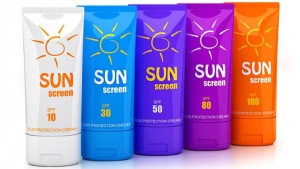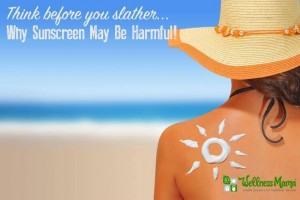
Colorful sunscreen from here
In class, Andrew talked about how no one knew smoking was dangerous because the results weren’t prevalent until 20 years later, and this made me wonder what I have been doing that could create health problems for me in the future. I am a redhead, which means that my entire life has consisted of smearing sunscreen on my entire body whenever leaving the house to prevent a nasty burn. For the past 18 years, I have pretty much always been covered in sunscreen, and now I am curious to see if sunscreen could be dangerous. What if the chemicals in our sunscreens actually caused cancer?

Photo from here
I first visited the American Academy of Dermatology’s website, where I learned that on average, 5.4 million people will be diagnosed with skin cancer each year, making it the most common cancer diagnosed. Melanoma is considered the most fatal skin cancer and will perhaps affect up to 76,380 people world wide this year. The ACD recommends daily sunscreen application.

squamous-cell carcinoma from here
I wanted to see the data, so I used google scholar to find this journal, The Null Hypothesis was that wearing sunscreen did not effect levels of BBCs, and the Alternative Hypothesis was that wearing sunscreen did effect levels of BBCs. This paper, focusing on the effect of sunscreen, was first published in November, 2006. This study was a randomized experiment, and the participants were 1,621 members of Nambour, an Australian community. These scientists has conducted a previous study where they discovered that there was a reduction of a type of cell called a squamous cell carcinomas (referred to as a SCC) in individuals that wore sunscreen daily and regularly over the course of four years. The Null Hypothesis was that wearing sunscreen did not effect levels of BBCs, and the Alternative Hypothesis was that wearing sunscreen did effect levels of BBCs. There was not the same type of decrease in the basal cell carcinoma cells (called BBC), but it was identified that BBCs could be delayed when compared to the results from the control group (no application of sunscreen). 92% of the participants followed the study until its completion in 2004. The remaining subjects were exposed to follow ups in their randomized groups.
Researchers discovered that those with fair skin (like me) had slightly lowered BBC rates then the participants who did not wear any sunscreen. For this conclusion, the researchers have included the p value, stating that P=0.03. With a low p-value below the usual alpha level of 0.05, the researchers were able to reject the null hypothesis and conclude that wearing sunscreen, especially for people with fair skin did indeed lower rates of BBCs.
After reading this paper, I googled, “Is Sunscreen bad for you?” Of course, many biased holistic sites popped up, but I was able to find a TIME Magazine article titled, Is Sunscreen Safe, and Do I Need It Every Day? that addressed the subject. Most sunscreens have nanoparticles, which reflect the sun’s UV lights, preventing skin exposure. According to the EWG, nanoparticles definitely provide great sun protection. Now, scientists worry that nanoparticles are small enough to be actually absorbed by our skin, and easily enter our blood streams. Researchers are more concerned than ever after unsettling results from lab tests on rats. Rats injected with these nanoparticles showed signs of cell distress, which is correlated with cancer. Although there is room for worry, these rats were inhaling and being injected with these particles, and tests have not been done where the particles were topically applied to the rat’s skin.
Although we should be concerned with the results on this rat study, more studies have to be conducted before scientists can make any claims. There is evidence that sun screen prevents the development of skin cancer and there is a pretty slim chance that these findings are all a fluke. Although it is impossible to rule out chance completely, it seems very unlikely that sunscreen does not have any effect on the reduction or delay of the development of BBCs. There is just developing research that sun screen could potentially cause other kind of cancers. For now, I will still keep wearing my sunscreen, but I will definitely change my skin care habits if more research emerges.

When I first saw this title it caught my eye right away. I never thought of sunscreen actually causing cancer. I am Irish and growing up I always got burnt however, now I don’t always need to wear sunscreen. I really like this post because it’s very “think outside the box” like. I wonder if the way sunscreen affects certain people is determinant on the type of skin that person has just as some people are more prone to getting burnt. I wonder if more research comes out that there will be a certain type of sunscreen made for certain skin types. This is definitely something to keep an eye on!
Hey!
First, really quick before I get into my comment, check third paragraph last sentence. You have the same thing written for your Null and Alternative hypothesis. I think you are missing a “not” in your Null. I know you know what you are talking about, so I don’t want you to miss points on something silly like that!! 🙂
This post was very informative. Ever since I was little, I have always worn a ton of sunscreen. My mom used to tan when she was my age, and always be golden brown. As of a few years ago, she had numerous age spots removed that were a direct cause of sun damage. It gets annoying being told to put on sunscreen by her, but I know that it will absolutely prevent long term effects. I tan pretty nicely, but as soon as you get a burn, you increase your chances of skin cancer.
The fact that BBC levels are decreased is really interesting. Similar to some of our pop quizzes, the question then becomes “after reading this study, should you stop wearing sunscreen”, and hopefully the answer is no. Low levels of BBC don’t outweigh the future effects of sun damage. I think that more could be done to see if BBC levels can be detrimental.
Hey Dana, very interesting blog post! First thing I would ask is what is your hypothesis? I would recommend going back and having a hypothesis and then refuting or confirming it if possible. I never use sun screen. Personally, I will burn the first time the weather gets hot, then it will turn into a tan and then I don’t need sun screen anymore. This is a very interesting topic as, in the next few years, we will all have kids and we will have to worry about them and their safety. So, does this affect them more than us? Maybe the chemicals in the sunscreen can affect their health. I found an article on this topic, but the website wellnessmama.com may not be the most unbiased source.
http://wellnessmama.com/55366/sunscreen-is-harmful/
Hey Dana, this is such an interesting blog post! Melanoma and other skin cancers caused by the sun run in my family so this really applies to my life. I usually tend to put on sunscreen when attending the beach or long days out in the sun to prevent these life-threatening cancers. The information about nanoparticles getting into our bloodstream is slightly frightening; however, since the tests and information are minimal I am going to continue wearing sunscreen to prevent these cancers. I found an interesting article that discusses the proper ways to use sunscreen which can decrease your chance of cancer (if these tests are accurate about nanoparticles), while not being burned: http://www.nytimes.com/2016/05/28/travel/you-know-you-should-use-sunscreen-what-dont-you-know.html?_r=0